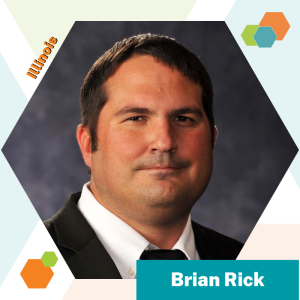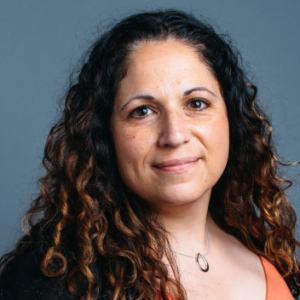 Meet instructor advocate Brian Rick, Career Technical Education (CTE) consultant from Illinois and a Fellow in the third cohort of the Postsecondary State CTE Leaders Fellowship at Advance CTE – Sponsored by ECMC Foundation.
Meet instructor advocate Brian Rick, Career Technical Education (CTE) consultant from Illinois and a Fellow in the third cohort of the Postsecondary State CTE Leaders Fellowship at Advance CTE – Sponsored by ECMC Foundation.
Q: Let’s start with your journey into CTE. How did your background shape your path into this field?
A: I originally wanted to be an architect all the way back to a very young age. I went through architecture school while working and also coaching at local schools. One of my college instructors and also a former high school teacher of mine both suggested that I consider teaching since they saw my love of working with students through coaching. I worked in the architecture and construction industry for about 4 years as a commercial project manager and when the opportunity to restart a shop program at my wife’s former high school came up I took the opportunity to shape the next generation of individuals skilled in trades.
Q: Professional development and new instructor training is limited for postsecondary instructors entering education from industry. How do you address this challenge at your institution and in Illinois?
A: Currently, through an ECMC mini-grant a few years ago, another Fellow and I saw this need to fill this gap and started developing a new system which we called Trades2trainer. This system was designed to help those transitioning directly from industry to the classroom as we both did. We are continuing to pilot new uses for this like the adjunct market and are working to give new adjunct instructors access to this program we have created nationwide. Previously, in Illinois I worked for the Illinois CTE project by the Illinois State Board of Education (ISBE) in which we also studied options and led professional development (PD) to support new teachers in general. I also have experience in this area from my prior time in administration at a community college in which many of our instructors came directly from industry in an adjunct role. The biggest thing I have learned is that doing nothing isn’t an option and that someone has to both transition and support these professionals to get them from surviving to thriving.
If you can support these new instructors and turn them into great instructors who are thriving, it cuts down on many of the challenges administrators already face in an already busy and challenging world.
Q: You’ve been vocal about the need to ensure that all adjunct faculty instructors coming from industry are adequately prepared to teach and succeed. Why do you think this is such a crucial issue?
A: I think many new teachers fail because they are not supported. This is especially true with professionals transitioning from industry. Many of them were at the top of their game when they left industry and may have been award winners in their field or even small business owners. When they transition into education, it can be a lonely world for them. I think in order to ensure student success we need consistency in instruction. When you get these instructors who are full of knowledge but then quit right away because they are not supported, the students suffer. I believe they know their trade, but we have to help them learn how to teach and translate that into student success.
Q: You’ve spoken before about the need to provide training and professional development to new instructors entering postsecondary education from industry to improve recruitment and retention. Can you share how this commitment has shaped your leadership and actions in your current role?
A: I have been working hard to ensure teacher retention over the last 5 years or so, as we know students need a consistent education process. When they go through a revolving door of instructors, it’s bad for the student learning environment and impacts student success. It also costs a lot of time, money, and effort for institutions to recruit new instructors either adjunct or full-time. If you can support these new instructors and turn them into great instructors who are thriving, it cuts down on many of the challenges administrators already face in an already busy and challenging world. I have stepped up in leadership roles nationwide to try to help this problem via serving in a variety of roles through ACTE at the state and national levels, as well as presented at a variety of conferences to help encourage all of us to work together on this problem. I believe this is not an isolated problem — it’s one that affects every state — and we have to keep hearing what’s going on in the field and working together to keep developing and refining these strategies to transition and retain these instructors.
Q: What do you see as the future of CTE in Illinois and what challenges do you think need to be addressed?
A: I think the future of CTE as a whole is bright. CTE delivers students opportunities to obtain gainful careers and achieve a better life. I have watched this pendulum swing in my nearly 20 years in the education field. I think we are truly heading back towards a spot where CTE education is considered a viable path alongside traditional college pathways. I think we need to continue to work to provide instructional support and retention; we also need to continue to expand offerings across the whole state. Unfortunately, in many rural communities schools may lack the resources to have any CTE teachers or courses to offer the students at all. We need to do a better job of interlinking K-12 and postsecondary to fill these gaps and ensure that we have either career centers or community colleges that all students have opportunities to attend in the most in-demand and currently valid career fields based on local, state, and national data. It’s time for us to stop saying “that’s just the way we have always done it” and actually make real progress at bridging these goals of full access to all CTE pathways.
As I believe we are all fighting these challenges together, it’s important to learn from those around you and what everyone else is experiencing.
Q: You’re clearly passionate about creating long-term change. What advice would you give to others who want to make a difference in CTE and postsecondary participation and attainment?
A: I would say get involved. I think we can all be reminded that while one person might not be able to change the world as a whole, many of us together have the ability to make collective change. I always encourage new teachers and instructors to get involved with state and national organizations, local business, and industry partners —- don’t just live in your bubble. Build your network early and let’s all work together to make these changes we need to ensure that every student has opportunities and every student succeeds. I would also say to always stay student focused on every decision you make. We all go into education to help our students succeed and oftentimes that means difficult decisions have to be made in challenging times so always remember lets do what’s best for our students.
Q: As a participant in Advance CTE’s national Fellowship, what do you hope to gain from this experience?
A: I continue to study the national landscape. As I believe we are all fighting these challenges together, it’s important to learn from those around you and what everyone else is experiencing. I think we are all stronger together so it’s important to build the network and work together. That is what I wanted to do with this fellowship is to continue to meet great people who are all passionate about solving these challenges together.
Brian’s journey to CTE leadership is a story of passion and dedication to providing high-quality training and support to postsecondary instructors. His insights are just one example of the incredible work being done by the fellows of the Advance CTE National Fellowship. To learn more about Brian and other inspiring leadership fellows, visit the Postsecondary State CTE Leaders Fellowship page, where Fellows share innovative approaches to developing and sustaining postsecondary CTE ecosystems.
Interested in developing your own CTE leadership fellowship in your state? Request more information via our request form or contact Dr. Kevin R. Johnson Sr. at [email protected].

